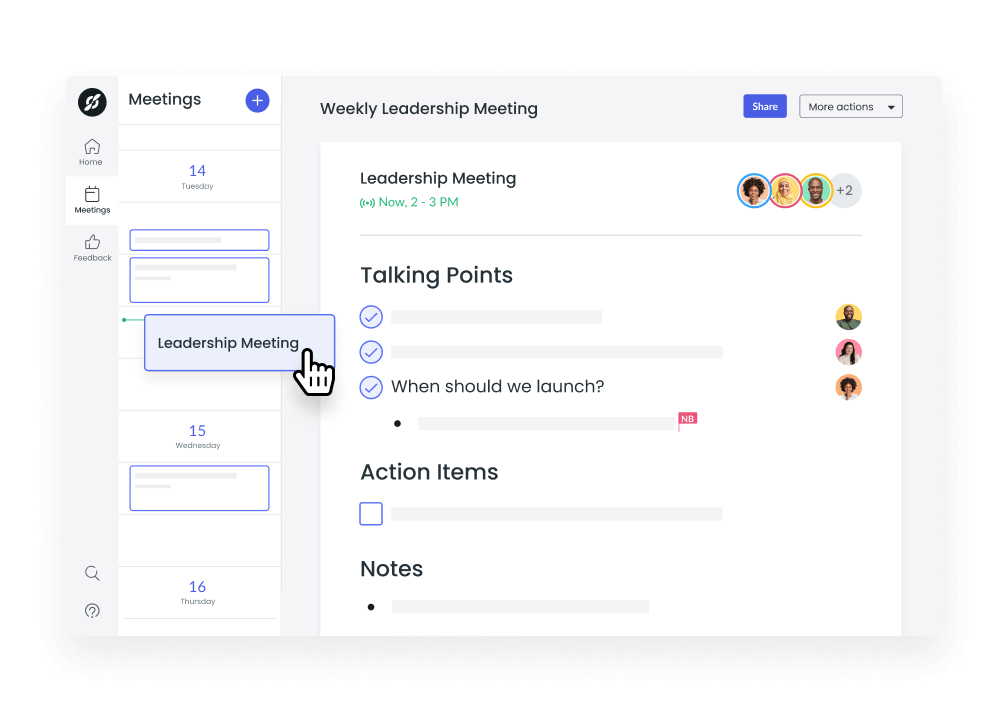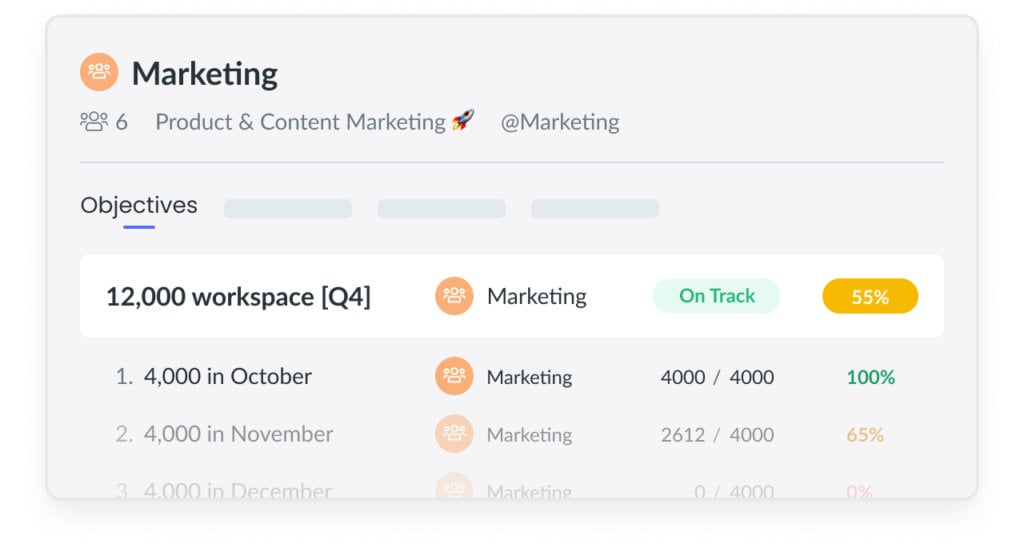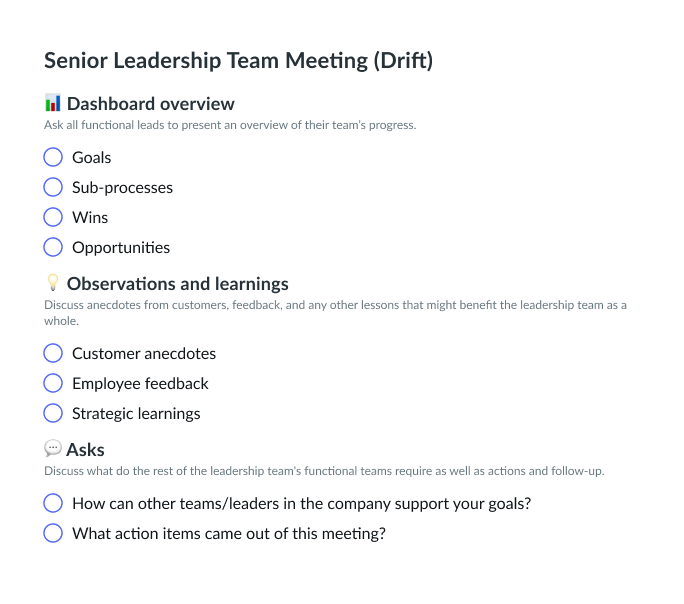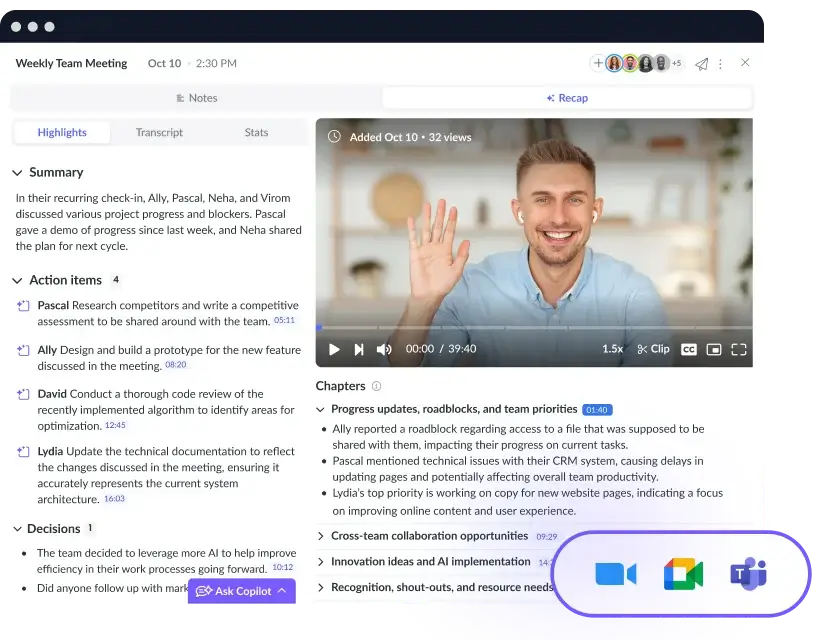A Complete Guide to Senior Leadership Teams
Explore how senior leaders use their skills to work together and tackle company challenges. Plus, get a free meeting agenda template!
Senior leaders. You see them walking from their corner offices to the boardroom every now and then and wonder what on earth goes on during their meetings. Or maybe you are one and wish your subordinates had a better understanding of what the role encompasses. Whether you are one, want to be one, or just have questions about them, your company’s senior leaders have a diverse set of responsibilities that directly impact the performance of the whole organization.
Let’s take a look at what a senior leadership team is, skills all good senior leaders should possess, and common roles and responsibilities that individuals at this level have.
- What is a senior leadership team?
- What is the purpose of a senior leadership team?
- Senior leadership team skills
- Senior leadership team roles and responsibilities
- Free senior leadership team meeting agenda
What is a senior leadership team?
The senior leadership team consists of the highest-ranking employees at a company. This group of executives or senior managers meet on a regular basis to strategize essential day-to-day business operations, lead core initiatives, and establish organization-wide policies and procedures. The team usually consists of heads of business, finance, human resources, and other specialist departments within the company. Some members of this team may even serve as the “faces” of the organization.

Run productive senior leadership team meetings
Increase meeting engagement and productivity with a collaborative agenda that the whole team can contribute to. Try using a tool like Fellow!

What is the purpose of a senior leadership team?
Hierarchy within a company preserves structure and offers a clear chain of command. A strong leadership team mobilizes all employees to propel the organization’s vision and mission forward. This team sets the tone for the entire company and leads by example. In addition to overseeing all members of specific teams, the senior leadership team is in charge of managing risks, hiring, and reviewing the performance of employees within each department. The senior leadership team is also responsible for promoting teamwork, managing complex challenges, and setting clear goals.
Senior leadership team skills
- Self-management
- Communication skills
- Creativity
- Effective goal setting
- Strategic thinking
- Problem-solving skills
1Self-management
If you learn self-control, you can master anything! Senior leaders know how to manage their time, behaviors, and emotions in a thoughtful and productive manner. They are also keenly aware of their strengths and weaknesses. A good leader is able to maintain a consistent workflow and open communication with teammates, as well as effectively delegate tasks. When the going gets tough, executives can adapt to changes with ease. They’re able to keep their eyes on the end goals and acknowledge their successes. If you want to master self-management, you can begin by trying to observe yourself from an objective standpoint!
2Communication skills
Communication is key in any role, but is especially vital for any senior leader that is in charge of a high-performing team! Employees rely on managers to communicate priorities, assign action items, and give regular feedback. Without communication, complications are bound to arise. All senior leaders need to establish clear communication processes to inspire positive change and get results. Effective leaders also listen actively, are transparent with staff, and are empathetic—they know that the success of their business relies on it!
3Creativity
Creative problems call for creative leaders! Creativity is essential to entrepreneurship that gets new companies started and sustains the best ones as they grow. Senior leaders don’t have to have all the ideas, but they should be able to create a culture where everyone feels like they can bring their ideas to the table. Senior leaders aren’t scared to challenge the status quo if it will allow them to make room for new and innovative processes. They see the value in bringing together people of different backgrounds, disciplines, and areas of expertise to solve complex business challenges.
4Effective goal setting
Great leaders know how to set realistic and achievable goals! They begin with the end in mind and can make a plan. A senior leader understands that setting a goal isn’t as simple as deciding on an objective and walking away. They want to set their team up for success and do so by delegating tasks that will lead everyone closer to milestone achievements. They meet with their subordinates regularly to assign key action items and coach them accordingly. They aren’t scared to push the team to new heights, and are always there to motivate everyone along the way.
5Strategic thinking
Senior leaders can approach the future in a focused and flexible manner. They’re willing to plan ahead, and can put their thoughts into action because they see the big picture. A great senior leadership team wants to gain a business advantage over competitors. They can anticipate potential problems and pivot when things don’t go to plan. Strategic-minded individuals challenge conventional ways of thinking and can see information through the lens of past, present, and future.
6Problem-solving skills
The ability to solve complex challenges is a valued skill. Members of a senior leadership team should be able to identify and define existing and potential future problems, evaluate potential solutions, implement a solution, and evaluate the outcome. Problem solvers are also skilled collaborators and work extremely well with other people and teams to achieve a common goal!
As Peter Anderton says in episode 83 of our Supermanagers podcast,
“You think you have to have all of the answers. And the pressure that creates is there’s a lot of senior managers out there under a huge amount of pressure. Much of it comes from the environment in which they find themselves. But a huge amount of it is self-generated because we think we’re the one that needs to have all of the answers.”
Senior leadership team roles and responsibilities
- Support employees
- Delegate tasks
- Set business OKRs
- Develop strategies to achieve business OKRs
- Build and maintain relationships with clients
- Manage and guarantee client satisfaction
1Support employees
We often forget that senior leaders are usually people managers too! One of the most important responsibilities they have is to support other employees within the company. When overseeing members of their respective teams, senior leaders should have regular group check-ins and one-on-one meetings with all direct reports. They should give and ask for regular performance feedback, recognize achievements, provide professional coaching, and be encouraging, of course.
2Delegate tasks
Senior leaders are high-performing employees, but that doesn’t mean they’re superheroes! Even the most productive leaders need to learn to delegate effectively. Leaders should strive to master their delegation skills so they can focus on high-level tasks. A good rule of thumb is that a project can be delegated if: someone else has the information and tools to complete the task, the task assignment provides an opportunity for a colleague to grow, and you have the time necessary to delegate responsibilities effectively.
3Set business OKRs
“OKRs” stands for objectives and key results. Senior leaders use OKRs to turn their desires into actionable results. Objectives are the milestone goals that one person or a group wants to achieve, and objectives should always be specific and measurable. For example, instead of saying, “I want to grow the business,” a better goal could be to increase business revenue by $200,000 in Q4. Key results are the stepping stones of the methodology. They give senior leaders a way to track the team’s progress and see how close they’re getting to the larger objective. For example, if the objective is to increase business revenue as previously stated, a key result could be scheduling 20 calls with new prospective clients next month.
With Fellow, you can stay on top of your team’s goals by clearly recording, defining, and tracking the progress of your OKRs in Fellow’s Objectives tool!

4Develop strategies to achieve business OKRs
Senior leaders know what strategies, processes, and systems to implement in order to work towards big objectives. However, you don’t need to be a CEO (chief executive officer) or COO (chief operations officer) to use OKRs. Objectives and key results are a method that anyone can use to set up for success. Whether you’re a senior leader or are just beginning your career, you can use Fellow to track your OKRs as part of your meeting workflow. When you can record, define, and track the results of your goals, you’ll be more likely to stay on top of them.
5Build and maintain relationships with clients
A major responsibility for senior leaders within a company is building and maintaining strong relationships with clients, prospective customers, and other stakeholders. Senior staff are often the individuals who interact directly with clients that bring major profits to the organization. Relationship management requires stellar communication skills, open-mindedness, confidence, and a high-level of organization.
6Manage and guarantee client satisfaction
In addition to building relationships, senior leaders need to manage and guarantee client satisfaction. A satisfied client will continue to support a business, refer others, and be a superstar advocate for your company. Someone directing a client relationship follows up, schedules meetings often, and manages client expectations transparently!
Free senior leadership team meeting agenda

Parting advice
If you’re a nervous senior leader or prospective one, remember this: Senior leaders aren’t important people. They’re simply regular people doing important jobs! The C-suite is only as intimidating as you make it. Any career goal is attainable with persistence and hard work.
Now that you’ve learned about senior leadership skills and the day-to-day roles and responsibilities of senior leaders, challenge yourself to improve your own competencies and to work on new projects. That corner office is waiting for you!












